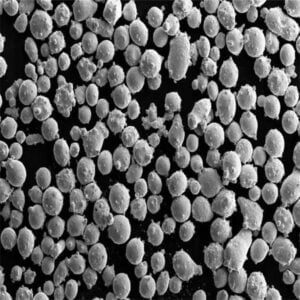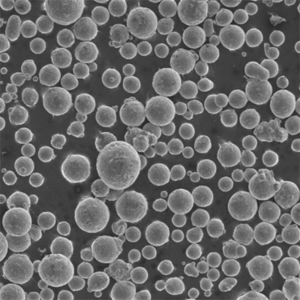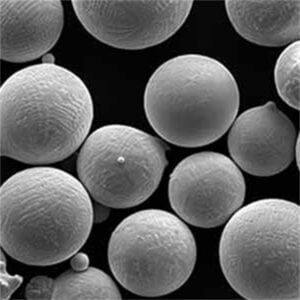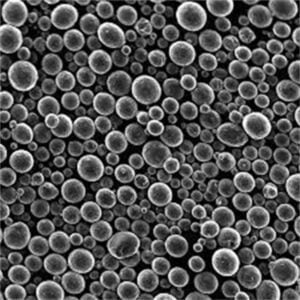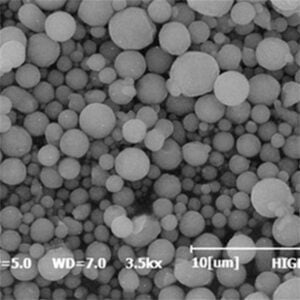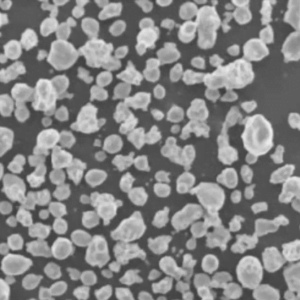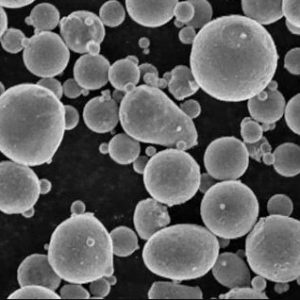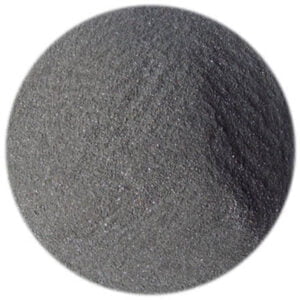Overview
Inconel 718 powder is a nickel-chromium-iron-molybdenum alloy powder used primarily in additive manufacturing and metal powder bed fusion applications. Some key details about Inconel 718 powder include:
- Composition: Nickel, chromium, iron, niobium, molybdenum, titanium, aluminum
- Properties: High strength, corrosion resistance, heat resistance, weldability
- Manufacturing Process: Gas atomization
- Particle Size Range: 15-45 microns generally
- Applications: Aerospace components, turbine blades, tooling, molds, marine components
- Standards: AMS 5662, AMS 5664, ASTM B718
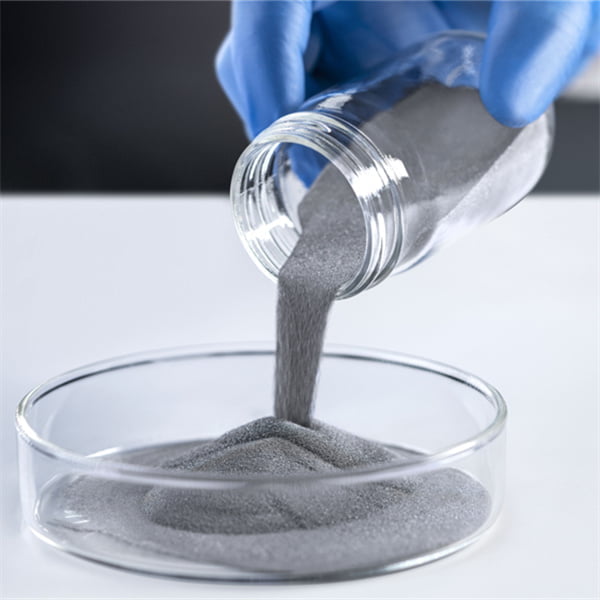
Composition of Inconel 718 Powder
Inconel 718 powder has the following nominal composition according to AMS 5662 and ASTM B718 standards:
| Element | Weight % |
|---|---|
| Nickel (Ni) | 50.0 – 55.0 |
| Chromium (Cr) | 17.0 – 21.0 |
| Iron (Fe) | Balance |
| Niobium (Nb) | 4.75 – 5.5 |
| Molybdenum (Mo) | 2.8 – 3.3 |
| Titanium (Ti) | 0.65 – 1.15 |
| Aluminum (Al) | 0.2 – 0.8 |
The nickel and chromium provide corrosion and oxidation resistance. Niobium enables precipitation strengthening of the alloy. Iron is the main base element. Molybdenum, titanium and aluminum enhance mechanical properties at elevated temperatures.
The ratio of nickel, chromium, and iron ensures optimal strengthening, while the additions of Nb, Mo, Ti and Al provide hardening and precipitation mechanisms. Control of composition within these ranges is critical to achieve target material properties after processing.
Properties of Inconel 718 Powder
Some of the key properties of Inconel 718 powder are:
Table 1: Properties of Inconel 718 powder
| Property | Description |
|---|---|
| Density | 8.19 g/cm3 |
| Melting Point | 1260-1336°C |
| Thermal Conductivity | 11.4 W/m-K at 20°C |
| Young’s Modulus | 205 GPa |
| Poisson’s Ratio | 0.294 |
| Yield Strength | 1310 MPa |
| Tensile Strength | 1495 MPa |
| Elongation | 12% |
The density, thermal and mechanical properties make Inconel 718 suitable for high performance parts able to withstand extreme environments. The powder metallurgy process preserves the fine grain structure leading to enhanced properties.
The strength is maintained to over 700°C, with adequate ductility and fatigue resistance. Oxidation resistance protects against corrosion up to 980°C. These characteristics allow Inconel 718 alloy to perform in applications with severe thermal cycling.
Particle Size Distribution of Inconel 718 Powder
Inconel 718 powder is manufactured via gas atomization process to produce spherical particles in a controlled size range. Typical particle size distributions are:
Table 2: Particle sizes of Inconel 718 powder
| Particle Size (microns) | Distribution (%) |
|---|---|
| 15-25 | 62 |
| 25-45 | 30 |
| 45-63 | 8 |
Narrow distribution ensures smooth powder flow and uniform melting. Smaller particles promote better sintering, while larger ones improve powder flow. The average size is usually 25-45 microns for most additive manufacturing processes working with metals.
Controlling particle shape and size distribution allows dense packing and effective layer-by-layer fusion essential for 3D printing applications. Sieving classifiers precisely sort particles into batches with target size ranges.
Manufacturing Process of Inconel 718 Powder
Gas atomization is the most common method to produce Inconel 718 spherical powders suitable for additive manufacturing. The manufacturing steps are:
- Melting – Inconel 718 is first induction melted under inert atmosphere
- Atomization – The liquid metal stream is broken into fine droplets using high pressure inert gas (usually nitrogen or argon)
- Solidification – The droplets rapidly cool and solidify into powder
- Collection – The atomized particles fall into a collection chamber
- Sieving – Powders are sieved into specific particle size distributions
Gas atomized powders have higher purity, more uniform composition, consistent particle shape and minimal satellites compared to water atomized powders. Smooth surface morphology improves powder flow during processing.
Precise control over gas flow, temperature and molten metal stream produces powders with target characteristics tailored for AM processes like laser powder bed fusion, binder jetting and directed energy deposition.
Applications of Inconel 718 Powder
The excellent strength and corrosion resistance at high temperatures make Inconel 718 alloy suitable for critical components in:
Table 3: Applications of Inconel 718 powder
| Industry | Components |
|---|---|
| Aerospace | Turbine blades, discs, combustors, casings, fasteners, gears |
| Power generation | Gas turbine hot section parts, blades, vanes, fasteners |
| Oil and gas | Downhole tools, wellhead parts, valves, pumps |
| Automotive | Turbocharger components, valves, exhaust manifolds |
| Chemical processing | Reactor vessels, heat exchanger tubes |
Additive manufacturing using Inconel 718 powder is ideal for making complex, customized parts with enhanced mechanical properties and geometries not possible with casting or machining.
Specifications and Standards
Inconel 718 powder products conform to the following specifications:
Table 4: Specifications for Inconel 718 powder
| Standard | Organization | Description |
|---|---|---|
| AMS 5662 | SAE | Chemical composition of nickel alloy |
| AMS 5664 | SAE | Atomized powder nickel alloy grades |
| ASTM B718 | ASTM | Standard for nickel-chromium-iron powder |
These specifications define the acceptable elemental composition ranges, sampling procedures, certificates and test methods to determine chemical and physical properties.
Popular size specifications used are -100/+325 mesh, -140/+325 mesh and -230/+400 mesh as per ASTM B214.
Suppliers of Inconel 718 Powder
Some leading global suppliers with pricing are:
Table 5: Inconel 718 powder suppliers and prices
| Company | Brand Names | Price per Kg |
|---|---|---|
| Sandvik | Osprey 718 | $120-160 |
| LPW Technology | CL-20ES | $100-140 |
| Praxair | 718 | $140-180 |
| Carpenter Technology | Custom 455® stainless | $110-150 |
| Erasteel | ERASTEEL718 | $130-170 |
Prices vary based on order volume, particle size range, shape tolerance and batch composition guarantees. Large OEM contracts get higher discounts compared to small prototype volumes. Geographical pricing also fluctuates based on regional supply-demand dynamics.
Pros and Cons of Inconel 718 for Additive Manufacturing
Table 6: Advantages and limitations of Inconel 718 powder
| Pros | Cons |
|---|---|
| Proven material with vast production experience | High material cost |
| Excellent strength at elevated temperatures | Lower deposition rate than steels |
| Good corrosion and oxidation resistance | Prone to cracking with lack of process control |
| Retains properties in as-built state | High residual stresses from rapid solidification |
| Customized geometries possible | Limited sizes for AM equipment |
| Faster design iterations | Post processing may be required |
Inconel 718 is more expensive than stainless steels but can operate safely 100°C higher. Although slower to print than steels, performance gains justify costs for high value applications in extreme environments.
With optimized AM parameters, the alloy achieves mechanical properties equivalent to or greater than cast and wrought material. However cracking issues can arise with higher build rates. Multi-laser systems help scale up productivity.
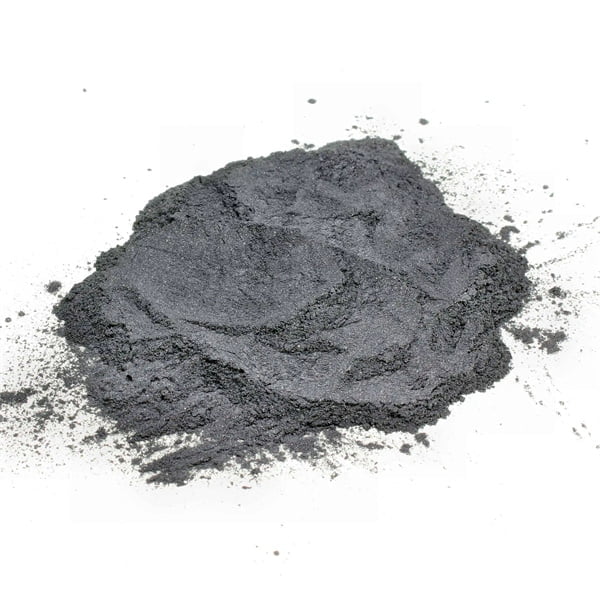
FAQs
Q: What is Inconel 718 alloy used for?
A: Inconel 718 nickel-based superalloy has exceptional strength at temperatures up to 700°C, oxidation and corrosion resistance. It is widely used in gas turbines, aircraft engines, nuclear reactors, pumps, tooling, and other critical components working under extreme conditions.
Q: Is Inconel 718 weldable?
A: Inconel 718 is weldable! This superalloy, known for its high strength and corrosion resistance even at extreme temperatures, is a favorite in the aerospace and power generation industries.
Q: How is Inconel 718 made?
A: It’s typically produced through a double melting process using vacuum induction melting (VIM) followed by vacuum arc remelting (VAR), which ensures a clean, high-purity material.
Q: Can Inconel 718 be machined?
A: Yes, but it’s challenging due to its toughness and work-hardening properties. Special tools and techniques are required for effective machining.
Q: How does Inconel 718 handle extreme environments?
A: It’s exceptionally resistant to oxidation and retains its strength even when subjected to very high temperatures, making it ideal for harsh environments.
Q: What is the difference between Inconel 718 and other Inconel alloys?
A: Each Inconel alloy has unique compositions and properties. Inconel 718 is specifically known for its high strength and ease of fabrication, including welding, which is not as straightforward with some other Inconel alloys.

